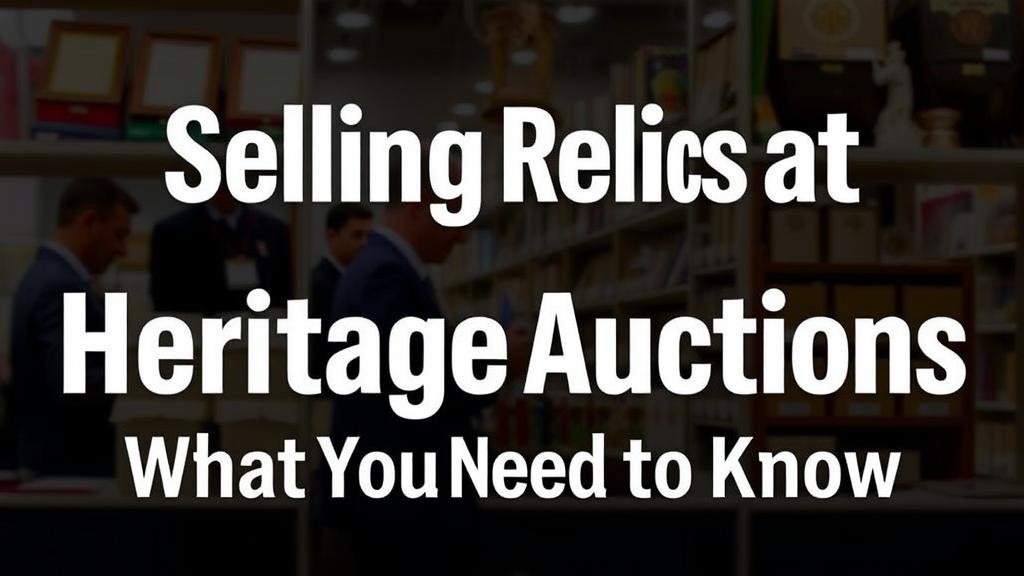Selling Relics at Heritage Auctions: What You Need to Know
Selling Relics at Heritage Auctions: What You Need to Know
Heritage Auctions is one of the worlds largest auction houses, specializing in a wide array of collectibles, including relics from various historical periods. Selling relics through Heritage Auctions offers unique opportunities for collectors and sellers alike. This article aims to provide a comprehensive overview of the essential aspects of selling relics at Heritage Auctions, from the initial evaluation to the final sale.
Understanding Relics
A relic is generally defined as an artifact that holds a historical significance, often linked to noteworthy individuals, events, or periods. Examples include:
- Ancient documents, such as handwritten letters or manuscripts.
- Personal items belonging to influential figures, like clothing or tools.
- Artifacts from significant events, such as military uniforms or equipment.
Relics are often sought after by historians, collectors, and institutions interested in preserving cultural heritage, making them valuable in both monetary and sentimental terms.
The Auction Process at Heritage
The process of selling relics at Heritage Auctions involves several crucial steps that each seller must understand to navigate successfully:
1. Evaluation and Appraisal
Before placing a relic for auction, it is critical to have it evaluated by experts. Heritage Auctions employs a team of seasoned appraisers who specialize in various categories of collectibles. An appraisal will typically assess:
- The relic’s historical significance and provenance.
- Its condition, authenticity, and wear over time.
- Market trends and comparable sales to determine a fair estimated value.
For example, a battlefield letter from General George Patton could be appraised significantly higher due to its provenance compared to a personal item with less historical context.
2. Consignment Agreement
Once evaluated, sellers must enter into a consignment agreement, outlining the terms of sale, including auction fees and payment terms. Heritage Auctions typically charges a sellers commission that ranges from 5% to 25% depending on the item’s value and category. Transparency in this process helps build trust between sellers and the auction house.
3. Marketing the Relic
Heritage Auctions invests significantly in marketing its auctions through various channels, including online platforms and catalogs. Relics are often highlighted in dedicated auctions or themed events that attract specific buyers. Sellers should take advantage of this marketing effort, ensuring their item is well-represented with high-quality photographs and detailed descriptions.
Legal Considerations
Selling relics involves navigating numerous legal frameworks that differ by jurisdiction. Sellers must ensure:
- That they possess rightful ownership without preceding claims from governments or individuals.
- Compliance with laws regulating the sale of cultural property, particularly for artifacts acquired from overseas.
For example, the United States has specific laws regarding the sale of Native American artifacts. Familiarity with these laws is essential for a successful transaction.
Real-World Applications: Success Stories
Heritage Auctions has facilitated many successful sales of notable relics. A striking example is the auction of an original manuscript of Bob Dylan’s “Like a Rolling Stone,†which sold for over $2 million. On the other hand, lesser-known relics, when presented with outstanding provenance or unique stories, can also achieve impressive prices, underscoring the importance of context in determining value.
Conclusion: Actionable Takeaways
For those interested in selling relics through Heritage Auctions, the following actionable steps can enhance your experience:
- Research and understand the historical context of your relic to maximize its value.
- Engage early with Heritages appraisal services to gain insights on your item.
- Be aware of legal ownership and compliance laws to avoid complications.
By adhering to these guidelines, sellers can better navigate the intricacies of the auction process, ensuring a successful sale of their relics at Heritage Auctions.



